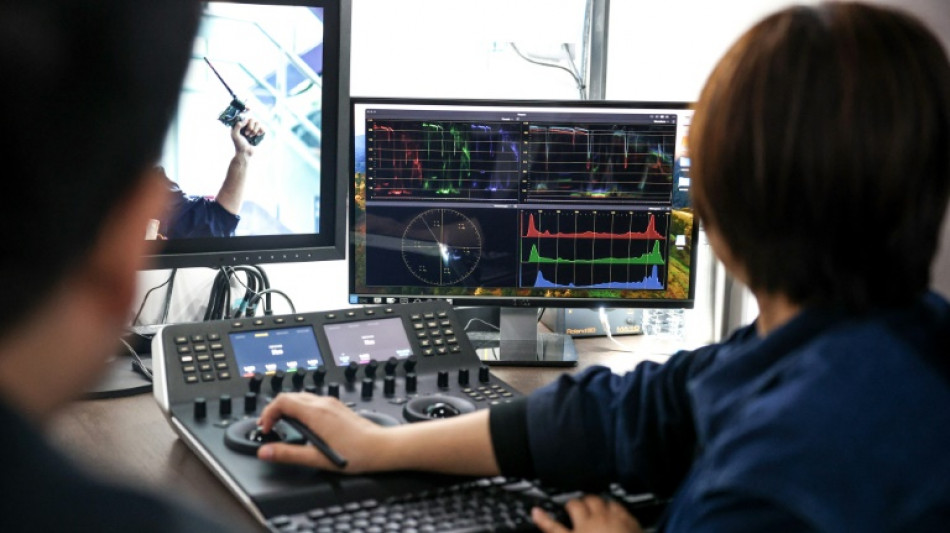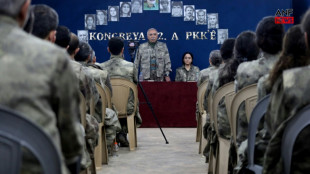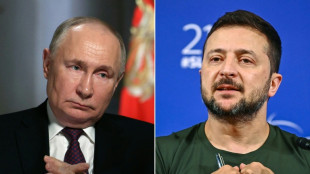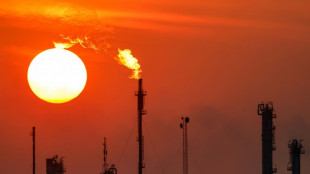
| CMSC | -0.14% | 22.05 | $ | |
| RBGPF | 3.48% | 65.27 | $ | |
| JRI | -0.77% | 12.91 | $ | |
| SCS | -0.46% | 10.77 | $ | |
| BCE | -1.14% | 22.305 | $ | |
| BCC | 1.28% | 94.31 | $ | |
| NGG | -0.42% | 67.25 | $ | |
| RIO | 1.6% | 62.41 | $ | |
| RYCEF | 1.05% | 10.49 | $ | |
| CMSD | -0.22% | 22.25 | $ | |
| AZN | -1.92% | 67.65 | $ | |
| VOD | -0.17% | 9.055 | $ | |
| RELX | 0.92% | 52.31 | $ | |
| GSK | -3.05% | 36.265 | $ | |
| BP | 0.85% | 30.45 | $ | |
| BTI | -1.56% | 40.35 | $ |

Taiwanese war drama 'wake-up call' to Chinese invasion threat
A Chinese military blockade of Taiwan ignites panic across the self-ruled island as banks shut down, families flee, fake news spreads and Taiwanese troops brace for attack.
The on-screen chaos is the basis of a new Taiwanese television series called "Zero Day", which creators hope will "awaken" people to the real-life threat of a Chinese invasion of Taiwan.
Beijing has long vowed to annex Taiwan, by force if necessary.
But rather than dramatise the cross-strait tensions, Taiwan's film and television industry has shied away from the topic for fear of losing access to the world's biggest Chinese language market.
Lo Ging-zim, one of 10 directors involved in "Zero Day", said the war in Ukraine, resurgence of the China-friendly Kuomintang party in Taiwan and China's growing efforts to influence the island meant it could no longer be ignored.
"Media around the world were talking about the next battlefield could be the Taiwan Strait," Lo told AFP, recalling 2022 when the idea for "Zero Day" emerged.
"It started from a group of people all worried and anxious about the same thing, deciding to gather and take action."
"Zero Day", which refers to the first day Chinese troops land in Taiwan, features 10 standalone episodes and is expected to premiere this year.
The trailer shows chaos erupting across Taiwan as Chinese forces surround the island on the pretext of searching for crew members of a military plane that disappeared over nearby waters.
Chinese disinformation floods Taiwan's internet, cash machines stop working, stock markets crash and families dragging suitcases seek to escape.
The actor playing Taiwan's president urges people "to unite" in a televised address, warning "without freedom, Taiwan is not Taiwan".
- 'Looming threat of war' -
Real-world analysts have warned a Chinese blockade of Taiwan could precede an invasion, and China's military has practised cutting off the island during drills.
Taiwan would be outgunned in any conflict with China and would need the United States and other countries to come to its defence.
"Zero Day" producer Cheng Hsin-mei, who wrote one of the episodes of the series, said she wanted to "awaken Taiwanese people to the looming threat of war".
She also hoped to inform the international community that Taiwan was not part of China.
"We must tell the world we are not the same political system -- we are a free and democratic place and we elect our own president," Cheng said.
"So when the regime launches an independent act of aggression, it is not a civil war, it is an invasion."
The "Zero Day" cast includes actors from Hong Kong, Japan and Taiwan.
Cheng said 70 percent of those approached for the series declined to take part, worried they would be blocked from productions hoping to enter China.
Taiwanese actor Kaiser Chuang plays a businessman in financial difficulty who unwittingly receives help from Chinese collaborators.
Chuang believes his involvement in "Zero Day" has already cost him one role, but he firmly insists the series "needed to be made".
"A life of peace, security and freedom doesn't come through fear and submission," said Chuang, describing "Zero Day" as a "wake-up call".
"It only comes from constant vigilance, making ourselves stronger, identity with our country and land, and unity among people living here."
- 'Not political propaganda' -
To make "Zero Day" more realistic, creators consulted military and political experts and shot key scenes on site, including a Taiwanese naval vessel and the Presidential Office in Taipei.
Lawmaker Lin Chien-chi from the Beijing-friendly main opposition Kuomintang party criticised the series for creating "an atmosphere of panic" and blurring "reality and fiction excessively".
"It inevitably leads to speculation about whether the filming perspective and thinking behind this series are related to the ruling party's political agenda," Lin told AFP, referring to the Democratic Progressive Party.
While the production received NT$230 million (US$7.6 million) in funding from the government and private sector, the director Lo insisted it was not propaganda.
"We are not making a political propaganda film, nor is it some kind of informational or civil defence educational video -- it's none of those," Lo said.
"It is a drama. It should attract the audience through human nature, human emotions and human vulnerability."
Cheng, the producer, said there had been strong international interest in the series and the team was now in talks with several online streaming platforms and television networks around the world.
"It's also a way to prove that even without access to the Chinese market, Taiwanese drama can still break into other regions," she said.
B.al-Saffar--BT



